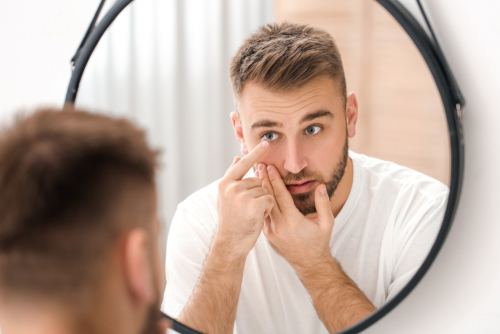
Do you wear contact lenses? You may wear them because they are convenient, but they can make your eyes dry.
Sound familiar? If your eyes feel dry or irritated, the reason could be due to your contact lenses. Keep reading to learn more about contacts and if they could be the cause of your dry eyes!
What is Dry Eye Syndrome?
Dry eye syndrome is a chronic condition that occurs when you have an insufficient tear film covering the front of the eye. A healthy tear film has three components: oil, water, and mucus.
The tear film has three layers:
- An oily layer on the outside
- A watery layer in the middle
- An inner mucus layer
If any of these components are not working as they should, it can lead to symptoms of dry eye syndrome. You naturally produce a mixture of tears and oil that coat the cornea with each blink. This mix protects the eyes from debris and prevents them from drying out.
Lubrication ensures eyes can smoothly pivot as you glance from one side to another. It also washes dust and pollen to the sides of the eye. Irritants collect in the corners where you can remove them to prevent further issues.
You may have dry eyes if you feel as if there is grit beneath your lids or what’s known as a foreign body sensation. Other symptoms you could experience include:
- Discomfort while blinking
- Eyes that sting or burn
- Increased light sensitivity
- Excessive tearing
- Redness
- Itching
What Causes Dry Eye Syndrome
The initial cause of dry eye syndrome is you don’t produce enough tears, or the tears you produce are low-quality. But other common causes of dry eye are environmental.
Low humidity on planes or in deserts may cause or increase this irritation. Another reason that your eyes can become dry is if you don’t blink enough. Spending too much time staring at a computer screen or other digital devices reduces your blink rate and lowers how much lubrication your eyes receive.
Aging can cause decreased tear production that requires medication like daily eye drops. Women are more likely to have dry eyes because of hormonal changes as they age. Taking medications such as antihistamines and birth control can also contribute to dry eye.
Dry eye can be a side effect for conditions like diabetes, rheumatoid arthritis, and lupus. People with thyroid disorders and vitamin A deficiency also struggle with sufficient eye lubrication.
Meibomian gland dysfunction may contribute to dry eyes. These glands are at the edge of the eyelids. They release oil film that prevents tears from evaporating quickly. Blocked glands release little to no oil, causing the tears to evaporate faster from the surface of the eye.
You might experience dry eyes only during allergy season if you suffer from allergies. This is a sign that irritants like pollen are present.
If you have allergies and dry eyes, a symptom of allergies to watch out for is itchiness. Seasonal allergy sufferers are more likely to have the urge to rub or scratch their eyes.
Pollen exposure creates histamine, which makes blood vessels in your eyes swell. The eyes often tear up or become watery to try and wash the irritant away. The inflammation causes itchiness as well as dry eyes.
Are My Contacts Making My Eyes Dry?
Contact lens-induced dry eye or CLIDE causes many people to stop wearing contacts. Thankfully, there are specialized contacts for people who have chronic dry eye symptoms.
Soft Contact Lenses
Some silicone hydrogel soft lenses create seals that limit tear evaporation. Manufacturers claim the contacts can hold in moisture for up to 16 hours.
Water gradient designs contain up to 80 percent water. Your eyes may be more comfortable with these unique models.
Scleral Lenses
Scleral lenses may also be an option. These custom-fit contacts are large-diameter rigid gas permeable. They fit over the cornea to create an area that prevents moisture from evaporating. Your natural tears and oils will lubricate the eye between the contact lens and the cornea.
Orthokeratology
Your eye doctor may recommend Orthokeratology or Ortho-K if you have severe or chronic dry eyes. This technique involves fitting a rigid gas permeable contact lens that’s then worn overnight.
Wearing these contact lenses while you’re sleeping helps to reshape your cornea gently. When you remove the contacts, you can see clearly in the morning.
The lenses reshape your cornea to address refractive errors like nearsightedness.
Visit your eye doctor if you’re concerned that contacts are contributing to dry eye symptoms. They can assess your current type of contact lenses and recommend changes to improve comfort.
How Can I Prevent Dry Eyes From Occurring?
Follow your eye doctor’s recommendations for contact lens care. Do not use the lenses for longer than recommended as they can cause irritation.
Use appropriate cleaning solutions and always wash your hands before handling any contact lenses. Wash the contacts in solution daily to avoid bacteria exposure and infections.
Throw away lenses that were exposed to conditions like pink eye. You could become reinfected if you continue using them.
Never share contacts with others, even if they have the same prescription. Multiple users can spread diseases and infections.
Don’t wear contacts in the shower, pool, or other bodies of water. Chlorine and saltwater can dry out the lenses. Bacteria in the water may increase your likelihood of infection and eye irritation.
Swap out your lenses according to manufacturer directions. Don’t wear daily ones overnight as this can lead to dry eye symptoms.
Many people that wear contact lenses are candidates for LASIK. This laser vision correction procedure reshapes your cornea to correct refractive errors. These include nearsightedness, farsightedness, and astigmatism.
Patients who have LASIK may no longer need to wear glasses or contacts. Most patients that undergo LASIK end up with 20/20 vision or better after the procedure, but it’s not a guarantee.
If you wear contact lenses and suffer from dry eyes, there’s no reason to continue dealing with the anguish associated with these frustrating symptoms. Schedule an appointment at Diagnostic Eye Center in Houston, TX, to discuss if dry eye treatment options may be right for you!
